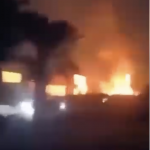By WSJ –
Elon Musk criticized an order by Australian authorities to remove a video of the stabbing of a religious leader, with the owner of social-media platform X arguing it sets a dangerous precedent that effectively allows one country to control the entire internet.
The row has intensified in recent days, with Australia’s eSafety commissioner—the official in charge of monitoring social media for harmful content—taking X to court for not doing enough to remove the content after it received a formal notice to take it down. Australian Prime Minister Anthony Albanese has also weighed in, arguing that Musk is fighting for the right to show violent videos on his platform.
“This guy is showing his arrogance,” Albanese said. “He’s a billionaire over there in the United States who thinks he’s above Australian law.”
At issue is whether X’s move to geoblock, rather than delete, the content is sufficient, the Australian Broadcasting Corp. reported. Geoblocking hides the content from Australian users, but it could still be circumvented by people using a virtual private network, which obscures a user’s location.
The Australia incident began the night of April 15, when Bishop Mar Mari Emmanuel of Christ the Good Shepherd Church was speaking at a lectern during a livestream. A video that circulated online showed a person in a black hoodie walking up to the bishop and appearing to stab Emmanuel several times, including in the face. The bishop fell to the ground as congregants rushed to his aid.Authorities have since charged a 16-year-old boy with the assault and have deemed the incident a terrorist attack.
On Monday night, an Australian judge issued a temporary injunction compelling X to hide the video content, but there will be more hearings on whether to extend the injunction, make it permanent and hit X with a civil penalty. The maximum penalty is about $500,000 per contravention, according to the eSafety commissioner’s office.
On X, Musk said the platform had censored the content for Australian users and that the content is stored only on servers in the U.S. He said he is worried that if any country is allowed to censor content for all countries, which he said is what Australian authorities are seeking, then any country could control the entire internet.
“Should the eSafety commissar (an unelected official) in Australia have authority over all countries on Earth?” he posted, using a disapproving nickname to refer to the eSafety commissioner.
On X, Musk posted an image showing the X logo overlaid on a sunny castle with the words “free speech” and “truth,” next to a stormy castle with the words “censorship” and “propaganda” and the logos of some other social-media companies that complied with Australia’s requests.
A representative for the eSafety commissioner—Julie Inman Grant, a former Twitter and Microsoft executive—declined to comment on Musk’s interpretation of the order, saying the matter is pending in court.
A representative for X said Tuesday that the company is in compliance with Australian law, has restricted all the relevant content in Australia and is removing any content that praises or celebrates the attacks.
In a post a few days ago, the company’s global government affairs X account said that while it respects the right of a country to enforce its laws within its jurisdiction, the eSafety commissioner doesn’t have the authority to dictate what content X users can see globally.
“Global takedown orders go against the very principles of a free and open internet and threaten free speech everywhere,” the post said.
Musk has been embroiled in similar disputes elsewhere since taking over X, formerly known as Twitter, in 2022. In Brazil, for example, he vowed to fight an order that called for removing several X accounts, which came as part of a broader clampdown on social-media accounts that were deemed to be propagating hate speech and false information.Other tech companies have also had to contend with increased government scrutiny of what appears online. Authorities in Hong Kong sought to ban online dissemination of “Glory to Hong Kong,” a song that became popular in the pro-democracy protest movement and appeared in videos on Google’s YouTube, though a judge ultimately rejected the ban. The government is appealing the decision.
In Australia, the eSafety commissioner worked cooperatively with other companies, including Google, Microsoft, Snap and TikTok to remove the stabbing video. But authorities weren’t satisfied with Facebook owner Meta and X, and issued formal notices to both companies seeking removal of the content. Meta eventually complied but the commissioner wasn’t satisfied with X, which was given specific URLs where the material was located.
“eSafety’s removal notice doesn’t relate to commentary, public debate or other posts about this event, even those which may link to extreme violent content,” a spokesperson for the eSafety commissioner said. “It only concerns the video of the violent stabbing attack on Bishop Mar Mari Emmanuel.”
Meta said in a blog post that when it received the removal notice from Australia’s eSafety commissioner regarding the attack on the bishop, it responded to confirm that it had already been taking action in relation to the content.
___________________





